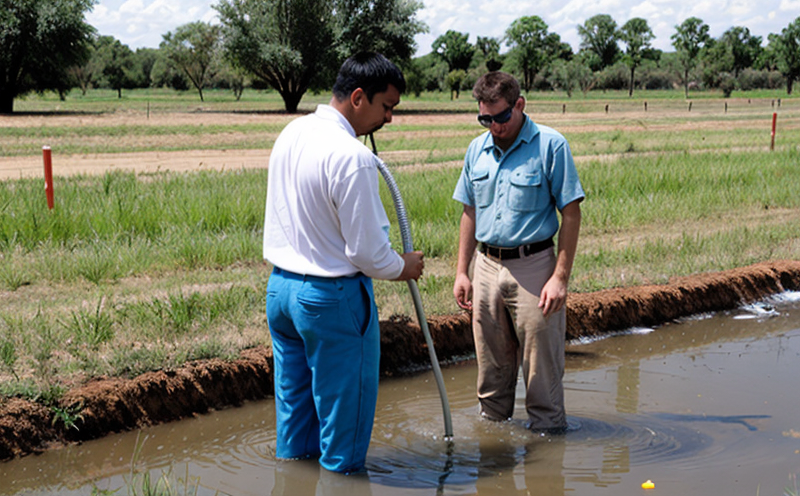APHA 5210B Biochemical Oxygen Demand BOD Test in Groundwater
The APHA 5210B Biochemical Oxygen Demand (BOD) test is a critical method for assessing the quality of groundwater. This test measures the amount of dissolved oxygen consumed by microorganisms breaking down organic matter present in the water sample over a specific period. Understanding BOD levels helps environmental scientists and engineers assess the presence of organic pollutants, which can indicate contamination from industrial activities, agricultural runoff, or urban waste.
In the context of groundwater testing, BOD is particularly important because it provides insight into the biodegradable organic content that could affect water quality and potentially impact ecosystems downstream. Groundwater, being a vital resource for drinking water supplies and agriculture, must meet stringent standards to ensure public health and environmental safety.
The test follows internationally recognized procedures outlined in the American Public Health Association (APHA) standard 5210B. This method involves a five-day incubation period during which the sample is exposed to controlled conditions that allow microbial activity to consume oxygen, thus simulating real-world degradation processes.
To perform this test accurately, it's essential to follow precise protocols for specimen preparation and handling. Samples must be collected in clean containers immediately after extraction from the aquifer or borehole. Properly sealed containers are crucial to prevent contamination that could skew results. Once brought back to the laboratory, samples should be transported under refrigerated conditions to maintain their integrity until analysis.
The APHA 5210B method requires the use of a standardized dilution process based on the initial concentration of dissolved oxygen in the sample. This ensures consistency across different water types and sources. After dilution, the sample is incubated at 20°C ± 1°C for five days to allow microbial activity to proceed. During this time, the reduction in dissolved oxygen levels indicates the BOD value.
After incubation, the test involves measuring the residual dissolved oxygen concentration using a calibrated dissolved oxygen meter. The difference between the initial and final dissolved oxygen values provides the BOD5 (biochemical oxygen demand over five days) figure. This measurement is crucial for determining compliance with regulatory limits set by environmental agencies such as the US Environmental Protection Agency.
Groundwater testing using the APHA 5210B method plays a vital role in water resource management, particularly in regions heavily reliant on groundwater for agriculture and drinking water. By monitoring BOD levels, stakeholders can identify potential sources of contamination early, allowing for targeted mitigation strategies to be implemented promptly.
Furthermore, this test supports sustainable practices by helping to minimize the environmental impact of pollutants entering groundwater systems. Understanding BOD helps in designing treatment processes that target specific contaminants effectively, ensuring safer water resources for future generations.
Eurolab Advantages
- Precision and Reliability: Our laboratory adheres strictly to international standards such as APHA 5210B, ensuring accurate results that are both reliable and replicable.
- Expertise in Groundwater Analysis: With years of experience in environmental testing, our team specializes in groundwater analysis, providing comprehensive insights into water quality issues.
- State-of-the-Art Facilities: Equipped with advanced laboratory instruments, including dissolved oxygen meters and standardized dilution apparatuses, we offer precise measurement capabilities.
- Dedicated Client Support: Our customer service team is always available to assist clients with any questions or concerns, ensuring a seamless testing process from start to finish.
At Eurolab, our commitment to quality and accuracy is unwavering. We ensure that every test conducted meets the highest standards, providing actionable data for informed decision-making in environmental management and resource protection.
Customer Impact and Satisfaction
- Compliance Assurance: By leveraging our APHA 5210B BOD testing services, customers ensure their groundwater meets regulatory standards set by environmental agencies like the EPA.
- Data-Driven Decision-Making: Accurate test results enable stakeholders to make informed decisions regarding water resource management and pollution control strategies.
- Enhanced Reputation: Demonstrating compliance with stringent testing protocols can significantly enhance a company's reputation in the industry, building trust among clients and stakeholders.
Our services have contributed to numerous successful projects across various sectors including agriculture, municipal water supply, and industrial operations. By providing reliable data, we empower our customers to take proactive steps towards sustainable practices and environmental stewardship.
Environmental and Sustainability Contributions
- Pollution Prevention: Early detection of contamination through BOD testing helps prevent further degradation of groundwater resources, thereby protecting ecosystems and public health.
- Sustainable Resource Use: By identifying pollutants promptly, our services support the development of sustainable water management strategies that minimize environmental impact.
- Educational Insights: Our comprehensive reports offer valuable educational insights into the nature and sources of contaminants, promoting better-informed decision-making processes.
Through our APHA 5210B BOD testing services, Eurolab actively contributes to environmental sustainability by providing robust data that supports sustainable practices in groundwater management. This aligns with global efforts towards cleaner water resources and healthier ecosystems.





